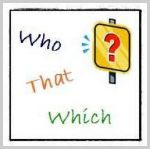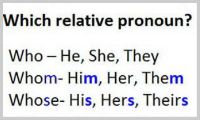 |
Learn English Locally, Apply It Worldwide! Enjoy Regular Practice |
Relative Clauses - Which, What, Who?
 |
These relative pronouns are very useful tools when you wish to link two sentences together, but... how do you know which one to use and where best to put it in your complex sentence? Now, that's a good question! |
Relative Clauses introduced by WHICH
Relative clauses are introduced by a relative pronoun, like which. There is an equivalence between this situation and a coordinate clause starting with and:
"She cooked a really good dinner, and we all enjoyed it."
"She cooked a really good dinner, which we all enjoyed."
When you have this situation, the relative pronoun 'which' refers to ‘dinner’, for which reason we don’t need to use ‘it’ at the end of the sentence – we would refer to the dinner twice in the same sentence. Observe that we use 'which' for things and also animals, not for people.
There are other situations where the relative pronoun points back to a whole clause or sentence:
He’s been working on his computer for too many hours, and that’s not good for his health.
He’s been working on his computer for too many hours, which is not good for his health. [Here we do not need to use ‘that’ for the same reason.]
Relative Clauses introduced by WHO
|
Although this is clearly used for words denoting people (as opposed to things), this is another confusing situation... How do you chose between so many forms of who? |
 |
For example:
"I met my colleague yesterday. She was promoted as a manager this year." "I met my colleague yesterday, who was promoted as a manager this year."
You see, in this case, who refers to 'she' from the previous sentence and this word is the subject of the sentence, so it is in its nominative case. For this, we use who and not the others.
But take the case of:
"Have you spoken with the electrician yet? I told him about our new show?"
"Have you spoken with the electrician yet, whom I told about our new show?"
Here we have the dative case - 'I told him', I gave him/her', 'you reminded him' - and in this situation you need to use whom and not the others. You also need to use this form in questions like "Whom did you tell this information?"
And the last alternative:
"Would you believe it? A crazy driver knocked my lamp post down last night!" "His car is the one parked badly in front of my house now."
"Would you believe it? A crazy driver, whose car is parked badly in front of my house now, knocked my lamp post down last night!"
Here we have the genitive case, expressing possession - its his car, therefore I say 'whose car' in the relative clause. I hope this is not too difficult.
Now do an exercise using what you've learned so far:
English Corner Weekly E-zine
Packed with knowledge, published on Tuesdays.
Get yours here!
Our Archives:
Our lessons in the names and sounds of letters, short & long vowel sounds, CVCs, CCVCs, CVCCs, sight words, vowel and consonant contrasts, etc.
Our lessons will help increase your vocabulary, word recognition, find meaning in context, skills for TOEFL tests and other games, for fun.
Here we shall build some lessons to help you improve your writing skills.
Lots of lessons: cause & effect, comparisons, linking signals, relative clauses, presenting information, expressing emotions and grammar games, of course. We had more lessons on: intensifying adverbs and phrasal verbs, expressing various concepts such as addition, exception, restriction and ambiguity. Lately we started some exercises: likes/dislikes, frequency adverbs (twice), verb tenses, etc.
Learn how to build a website, by using the SBI! system - start from the basics, developing a site concept and a niche, supply and demand, learn about profitability and monetization, payment processing, register domain, website structure and content as a pyramid. Also learn about the tools I'm using to build this website. We also covered how to build traffic, working with search engines, building a good system of inbound links, using social marketing and blogs with the SBI system, how to use Socialize It and Form Build It, how to publish an e-zine and how to build a social network in your niche.
We looked at a few games by now: Countable & uncountable nouns, Free Rice, Name That Thing, Spell It, Spelloween, the Phrasal Verbs Game, Preposition Desert, The Sentence Game, Word Confusion, Word Wangling, Buzzing Bees, and The Verb Viper Game.
Be prepared to play and learn more pretty soon.
